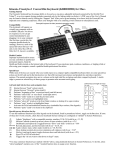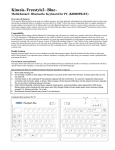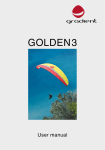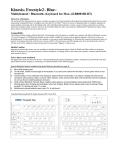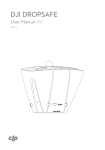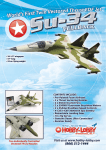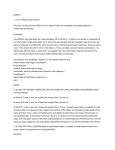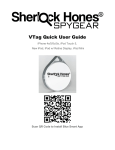Download User manual
Transcript
Characteristics Gradient’s new Freestyle2 is your wing for everything paragliding is today. It doesn’t matter whether you’re launching into a strong wind, if you’re working on acro manoeuvres and transitions, or if you just love dropping its sharp-shaped winglet into the centre of a cracking thermal. With the Freestyle2 you’ll find your personal playground in the air, anywhere on the planet. It might just change your life as you jack in that fulltime job and head off to find the best place to perfect your skills, training as often as you can. The Freestyle2 hones your intuition into the perfect line in the sky, the perfect climb and the perfect, stylish acro run. At the same time the Freestyle2 will keep you busy. With its sensitive feedback it will clearly show off your skill level, while offering you room to perfect those skills. Training with the Freestyle2 will help take your flying to the next level – and will help you move on up to a dedicated Acro wing. www.gradient.cx, tel/fax: +420 257 216 319, e-mail: [email protected] Concept The Freestyle2 is a completely new development by the Gradient Team and was designed in cooperation with experienced acro pilots. The wing’s main characteristics are the highly stable profile, easy stall characteristics and sensitive handling in deep stall – fundamental basics for an up-to-date freestyle wing. Gradient’s ‘no compromise’ philosophy has been used to in the build – only materials of the highest standard have been used, helping make this wing what it is. There are reinforcements at all points of high stress, building security into your wing and giving you ultimate peace of mind. Rated to 12G and a take-off weight of 135kg the Freestyle2 passed its official shock and load tests without any problems. This opens the door to all international FAI-accredited acro competitions. The wing’s colour scheme can be customized too – just ask us for details and we’ll make your dream wing come true. Technical Data Freestyle2 20 22 24 Flat Area m2 19,37 21,92 23,94 Span m 10,51 11,18 11,68 5,7 5,7 5,7 m 2,30 2,45 2,56 57 57 57 Weight of the glider kg 4,2 4,7 5,1 Take-off weight range kg 60-110 70-120 80-130 926-1 926-1 926-1 Aspect ratio Max. chord Number of cells Certification EN * Maintenance Paragliders are aircraft and as such demand a high level of maintenance and inspection. That is why great importance is attached to after-sales service. Gradient provides after-sales service at our headquarters in Prague or by Gradientauthorised workshops. For more details contact your national importer or Gradient. If you handle your glider with care and store it in a suitable place it can last you a very long time. On the other hand, neglecting maintenance, bad storage and the use of unsuitable cleaning products can reduce the lifetime of your glider significantly or may even make it dangerous. You should follow these rules: • Choose a suitable area for your launches. Lines caught on roots or rocks lead to unnecessary strains on the attachment tabs during inflation. Snagging lines may rip the canopy tissue or damage lines. • When landing, never let the canopy fall on its leading edge in front of the pilot! The effect of these forceful collisions and the sudden pressure increase can severely www.gradient.cx, tel/fax: +420 257 216 319, e-mail: [email protected] damage the air-resistant coating of the canopy as well as weakening the ribs and seams. • Protect the canopy from unnecessary strain. Inconsiderate handling of your glider, namely pulling it over grass, soil, sand or even over rocks, will significantly reduce its lifetime and increase its air-porosity. • Protect your canopy and lines from unnecessary exposure to sunlight. UV-rays can damage many parts of a paraglider. • Try not to pack your glider when wet! If there’s no other way then dry it as soon as possible but away from direct sunlight • Don’t let your glider come into contact with seawater. If it does, rinse the lines, canopy and risers with fresh water and dry before storing. • When storing or during transport make sure your glider isn’t exposed to temperatures higher than 50 degrees Celsius. • Never let the glider come into contact with chemicals. Clean the paraglider with clean lukewarm water only. • For long-term storage don’t pack the glider too tightly and store it in a cold, dry and well-ventilated room. • After tree- or water landings always examine the glider carefully. If you suspect that the flight features of your paraglider have changed, contact the nearest authorised Gradient supplier as soon as possible. • After 200 flying hours or after two years at the latest your Freestyle2 must be thoroughly checked and tested by the manufacturer. Repairs Only small repairs may be done by the user, which means repairs that don’t change the airworthiness of the paraglider. Among these are fixing small tears (but not seams) up to 10 cm, changing damaged lines or the change of rubber line-fixation rings on the small karabiners. When repairing your paraglider on your own follow these rules: • When repairing the sail use a self-adhesive patch specified for this purpose. • The only admissible repairs done on lines are those where the damaged lines are changed for new ones, exclusively supplied by Gradient or one of our authorised dealers or service centres. • When ordering lines use the code indicators given in the line diagram. Also give the indicator „Freestyle2“ and the size of the canopy of your glider, followed by the line code. For example: the outside long line in row A for Freestyle2 22: Freestyle2 22 A 1.3. • An exception is changing a control line while out flying. For this purpose the www.gradient.cx, tel/fax: +420 257 216 319, e-mail: [email protected] manufacturer encloses a spare line with every Freestyle2 with a prepared loop on one end. The right length should be adjusted according to the same line on the opposite side of the canopy. As soon as you can yourself swap the line for an original one from your authorised Gradient service centre. Freestyle2 Line Map www.gradient.cx, tel/fax: +420 257 216 319, e-mail: [email protected]




